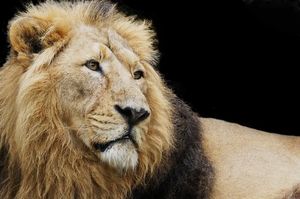The apostle John had a vision of God holding in his hand a scroll that was sealed with seven seals (Revelation 5:1-7). But no one was able to open the scroll, so he wept. Then an elder spoke to him, saying, ‘Behold, the Lion of the tribe of Judah, the Root of David, has prevailed to open the scroll and to loose its seven seals’. Immediately after that, John saw the Lamb take the scroll out of the hand of God.
All who read that passage will understand that ‘the Lion of the tribe of Judah’ and the Lamb looking ‘as though it had been slain’ both have reference to the Lord Jesus.
How strange! The lion and the lamb are animals totally unlike each other. The lion is one of the fiercest among the wild beasts while the lamb is one of the mildest. The lion is capable of subduing other beasts but none of the other beasts can subdue the lion.

The lamb is completely different. Not only is it incapable of subduing other animals, it is itself at their mercy. It has no strength to resist; it is not in its nature to resist; and on no account will it attempt to do so. So it can be dragged to a place of slaughter without it making the slightest effort to resist.
Since these two animals are totally different, how is it that the Bible calls the Lord Jesus a lion and at the same time refers to him as a lamb? If he is a lion, how can he be a lamb? The fact remains that in this passage of the Bible he is described in these two ways. What is the explanation?
The lamb
The lion and the lamb represent different periods. When our Lord Jesus first came into the world he came as a lamb. Notice how meek and lowly, gentle and humble, he was at that time. ‘When he was reviled [he] did not revile in return, when he suffered, he did not threaten, but committed himself to him who judges righteously — by whose stripes you were healed’ (1 Peter 2:23-24).
Anyone could take advantage of him. Anyone could ill-treat him. Yet he strove with no one. ‘He was oppressed, and he was afflicted, yet he opened not his mouth; he was led as a lamb to the slaughter, and as a sheep before its shearers is dumb, so he opened not his mouth’ (Isaiah 53:7).
The lion
But when he comes the second time, he will be the universal ruler. He will come in glory and majesty like a lion. ‘God will give him the heathen for his inheritance and the uttermost parts of the earth for his possession. He shall break them with a rod of iron and dash them in pieces like a potter’s vessel’ (Psalm 2:8,9).
Yet even when our Lord came into the world the first time, he was not always meek like a lamb; sometimes he exercised majestic and fearsome power like a lion.
If we study the Gospel records carefully, we shall discover that whenever he was insulted and derided, or when he was subjected to invective and persecution, he was invariably meek and gentle like a lamb.
But whenever he was stirred to righteous anger, as when the issue was the truth and righteousness of God, he was fierce and fearful like a lion. See him, for instance, in the temple. Was he not majestic and fearful like a lion?
Listen to him reproving the scribes and Pharisees: ‘Woe to you, scribes and Pharisees, hypocrites! For you cleanse the outside of the cup and the dish, but inside they are full of extortion and self-indulgence. Blind Pharisees, first cleanse the inside of the cup and dish, that the outside of them may be clean also’ (Matthew 23:25-28).
Disciples
These scribes and Pharisees held position and power in Jewish society. They were everywhere esteemed and respected. Yet it was without regard for their feelings that the Lord uncovered their plotting and rebuked their sin.
What about us who are disciples of the Lord? Ought we not to be like him in these things? That is, when we are insulted, opposed, or persecuted, or when we suffer injury, ought we not to be gentle like a lamb and on no account strive with our adversaries?
However, when we are witnessing to our faith, and to the truth of God, ought we not to be forceful and fierce like a lion? No matter how men threaten or intimidate us, and no matter what misfortunes or dangers confront us, we must confess the name of the Lord without fail.
Our hearts must be set to follow the way of the Lord and on no account to rebel against his commands. We must fear neither threats nor difficulty nor danger. We should press ahead like lions with no thought whatever of retreating.
Appropriate
We may be feared — but we shall not fear. A good Christian should never strive with anyone on account of money, property, possessions or fame. But at the same time he should never yield an inch when it is a matter of faith and truth.
When it is appropriate to act like a lamb he should act like a lamb; but when it is appropriate to act like a lion he should act like a lion.
We acknowledge that there are certainly many Christians who resemble both lion and lamb. But unhappily the occasions when they act like the lion or the lamb are inappropriate. When they ought to act like a lion, they act like a lamb. And when they ought to act like a lamb, they act like a lion.
At a time when they ought to be boldly fighting for the faith and for the truth they are as soft as water. They keep their mouths closed and utter no word. To avoid opposition and suffering, they may even follow the path of unbelievers and participate in activities that are contrary to the truth.
Confrontation
On the other hand, if anyone should put in jeopardy their property, their business, their profits or their reputation, they are unwilling to yield to them in the slightest. Immediately stiffening themselves, they confront those who would take advantage of them without hesitation.
Observe the attitude of Christian people when they are in dispute with people over money, property, reputation or possessions — many of them are stern and ruthless in the extreme, just like harsh and frightening lions.
Yet at a time when they should be making a stand for faith and truth, they become meek and gentle like a lamb with nothing to say whatever.
Compare people who act in this way with the example that was set by our Lord, and you will want to weep. This painful and shameful phenomenon is one that shows itself everywhere. When matters of property and possessions are at issue, fierce quarrels arise between husband and wife, brothers and sisters, and even children and parents.
In order to grab land and power, people in society will curse one another, fight one another, go to law with one another, and even kill one another. They reach the point at which truth and righteousness no longer have any value in their thinking. No one is prepared to fight for these qualities.
Saintly standing
It is painful enough to see people of the world who act in this way but, contrary to expectation, you often find Christian people who behave similarly.
What can be more lamentable than this? When a Christian clashes with other people and quarrels with them on account of his possessions, reputation, authority or estate, he should be ashamed of himself. For he is not acting like his Lord. He throws away his standing as a saint.
When a Christian clashes with other people in matters like this, and asks me to help him settle the affair, I know he is not a good Christian without having to investigate.
For if he is oppressing others, he obviously has no ground to stand on. And if he himself is being oppressed and wants to offer resistance, then again he is unlike his Lord.
On the other hand, if a Christian dares not make a stand in order to maintain the faith and the truth of God, that also becomes a matter of shame. For he is not emulating his Lord and he forfeits his role as a saint.
Acknowledging failure
Let us, then, quickly acknowledge our failures and errors of the past. We must ask God to have mercy upon us so that from now on we refrain from striving with men for our own gain or glory.
At the same time, we should ask the Lord to give us courage so that when it comes to matters of the faith and of truth we do not yield, even an inch. Our Lord is both a Lamb and a Lion. In the same way, we also ought to be both lambs and lions.
An edited version of one of the twenty sermons by Wang Ming Dao featured in Spiritual Food (Mayflower Christian Books) 175 pages, £4.95, ISBN 0-907821-01-4






















